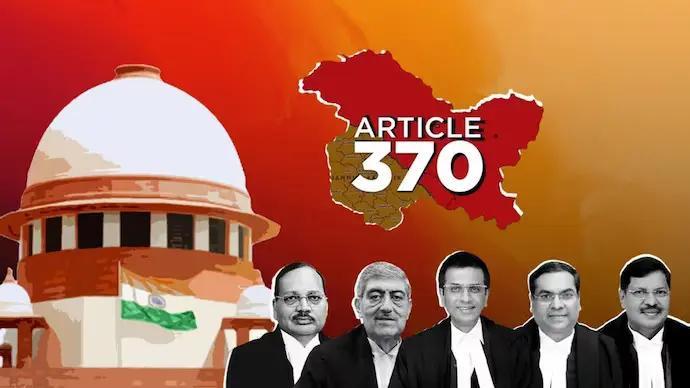December 12, 2023
Supreme Court Upholds Abrogation of Article 370: Key Findings and Implications
Unanimous Ruling on Article 370 Abrogation
- The recent verdict by a Constitution Bench of the Supreme Court reiterates the validation of the President’s authority to abrogate Article 370 in August 2019, a pivotal event that led to the restructuring of Jammu and Kashmir into two Union Territories while stripping away its special privileges.
Key Issues Scrutinized and Court’s Verdict
- Sovereignty Status of Jammu and Kashmir
- Petitioners’ Stand: The argument centered on J&K retaining a distinct sovereignty upon its accession to India, setting it apart from other princely states.
- Court’s Analysis: The Court observed J&K’s classification as a Part III state in the Indian Constitution and J&K’s own declaration within Section 3 of its Constitution, asserting its integral status within India.
- Final Verdict: The Court concluded that J&K did not retain its sovereignty, affirming the ongoing integration process, culminating in the Presidential declaration under Article 370(3).
Nature of Article 370: Temporary or Permanent?
- Arguments Presented: One contention posited Article 370 as a permanent provision, while contrasting viewpoints perceived it as temporary.
- Court’s Position: Both Chief Justice Chandrachud and Justice Kaul aligned in considering Article 370 as a temporary provision.
Legality of Abrogating Article 370
- Abrogation Process: President Kovind’s issuance of CO 272 in August 2019, amending Article 367 and redefining the “Constituent Assembly of Jammu and Kashmir” as the “Legislative Assembly of Jammu and Kashmir.”
- Court’s Validation: The Court upheld this process, asserting that post-dissolution of J&K’s Constituent Assembly, the President had the unilateral authority to abrogate Article 370.
President’s Rule Actions
- Challenge and Reference: The challenge revolved around the powers exercised under Article 356 (President’s rule). The Court referred to the Bommai ruling of 1994, emphasizing the necessity for actions under President’s rule to be devoid of mala fide intent or irrationality.
- Upholding Union’s Dominance: The Court interpreted Parliament’s capability to alter a state’s status during President’s rule. Additionally, it highlighted the President’s referral of the Jammu and Kashmir Reorganisation Bill, 2019, to Parliament for assessment while the state was under President’s rule.
- Validity of Executive Orders: Applying the Bommai ruling standards, the Court validated the executive orders, stressing the need to substantiate mala fides for challenging such actions.
Conclusion: Key Takeaways
- The Supreme Court’s conclusive ruling reaffirms J&K’s integral status within India and emphasizes the temporary nature of Article 370. Notably, the judgment potentially expands the Union’s powers under President’s rule, posing implications for the federal balance. This landmark ruling establishes a significant precedent in delineating Union and state powers, resonating deeply within the contours of Indian federalism.
Llama 3:
April 24, 2024
Global Plastic Treaty:
April 24, 2024
THE WORLD TIGER DAY CELEBRATION
August 5, 2022
A new Sample data for Polity & Governance
July 27, 2022
Sample data for Polity & Governance
July 27, 2022

